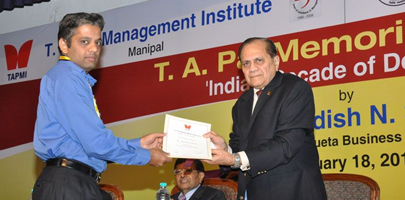India’s decade of destination

Dr. Jagdish N Sheth, Professor of Marketing, Goizueta Business School, Emory University, delivered a lecture on ‘India’s Decade of Destination’ to the students of TAPMI. This lecture, organized by T A Pai Management Institute and the Academy of General Education, Manipal, was a part of the 28th T.A. Pai Memorial Lecture.
Dr. Ramdas M. Pai (Chancellor, Manipal University), Dr. Saji Gopinath (Director, TAPMI) were guests on the dais. The audience consisted of management students and faculty of TAPMI and Manipal University.
Dr. Sheth talked about the economic freedom which the country got 20 years ago due to the opening up of the capitalist market economy. According to him, this has made India one of the fastest growing economies in the world, facilitated an increase in the reserves mainly due to the boom in the IT sector, resulted in a surge in the performance of the Indian stock market, and has encouraged the creation of large new enterprises. Dr. Sheth spoke about the changing image of India, which has been facilitated by the economic reforms. He emphasized on the ‘can-do’ attitude of the educated class, and also the empowerment of the new middle class, who have a much higher standard of living.
Dr. Sheth predicted that by 2025, some of the largest global enterprises will be of Indian origin. India will also become the second largest consumer market in the world, and will be able to attract global enterprises from around the world. He specified that India will be in a position to partner with countries like Bolivia, Peru, Myanmar, Egypt, and many resource-rich African countries on the business front, as India’s global alignment will be less on ideology and more on markets and resources. He also predicted that India will gain a lot of geopolitical clout, including a permanent seat in the UN Security Council.
Dr. Sheth attributed these bright predictions for India to its huge resource advantage. He focused on India’s demographic dividend, as India’s population will have the largest young educated workforce by 2025. He also spoke about India’s rich natural resources, including agricultural and agricultural raw materials, and livestock. Dr. Sheth also spoke about the vast Indian Diaspora of more than twenty million Non-Residential Indians, who are continuously being recognized as a great asset for the ascendancy of India as a globally integrated economic superpower. He also spoke about the great diversity prevalent in India, which is functioning diversity across languages, cultures, geography and to a large extent, across religions.
Despite these great resource advantages, India also possesses significant legacy weaknesses. Dr. Sheth spoke about the Indian Economy, which is highly fragmented and lacks scale advantage. He attributed this to the government’s historical policy to limit the production capacity by licenses, and also due to the presence of many family-owned businesses and the unorganized sector. Dr. Sheth also spoke about the lack of infrastructure as a major concern, especially in the manufacturing domain, since a large manufacturing base is crucial for a nation to become a global sourcing destination.
Dr. Sheth also emphasized on the lack of enforcement in the country as one of its weaknesses. He reiterated that India needs governance badly, as without proper governance and civic mindset, it has the potential to “disintegrate into a society of powerful mafia groups who extort wealth from the economy”. Dr. Sheth also spoke about the lack of investment in the education and investment sector as one of India’s major weaknesses.
In order to start the reforms, Dr. Sheth mentioned that India needs a sense of urgency and purpose. People need to ask what they can do for the nation, and not the other way round. Massive investment in infrastructure is also imperative, as it is the foundation of economic growth and prosperity. He specified that India should refocus on “manufacturing anchored to its resource advantages”, and embrace inclusive growth to reduce the gap between the rich and the poor. He also spoke about the massive political reforms that are necessary for the economic reforms to achieve their full potential. Dr. Sheth concluded by saying that despite all the obstacles, he is optimistic about the future of India, as he believes that the world needs India more than ever today for global growth.

